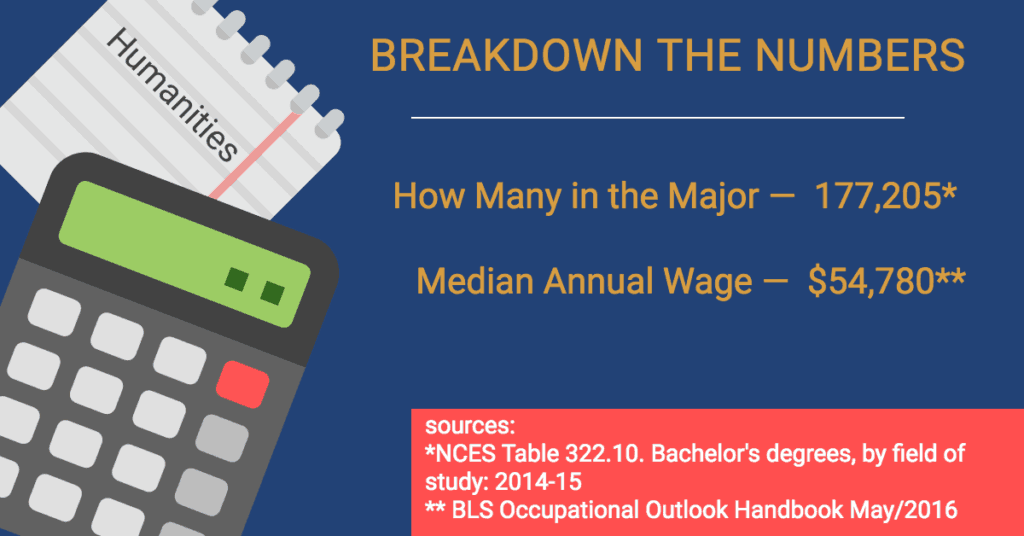
There’s a lot of talk today about whether a liberal arts or humanities degree is really worthwhile. Maybe it’s been good enough for the last three thousand years of western civilization, but surely today liberal arts and humanities learning is outdated and obsolete.
Then you hear what employers are looking for in candidates – out-of-the-box thinking; understanding of human nature; strong communication skills; a talent for analysis and evaluation; strong reasoning ability. And while you can definitely develop these skills in a business or science degree program, they’re the bread and butter of the liberal arts and humanities.
But going blindly into a liberal arts or humanities degree isn’t necessarily a smart move, unless you already know you want to teach. It makes more sense to look at this field strategically, as a major combined with a more “practical” minor, or as a minor to add value to your more technical major.
That’s why the College Consensus is here – to help prospective students weigh out all their options ahead of time, with the full, panoramic view of the higher education system, job market, and more. This helpful guide to Liberal Arts & Humanities degrees is here to help you make the best decision, out of all the options out there, for your future.
Recommended Online Colleges for Liberal Arts
Visit sites to learn more about enrollment, tuition, and aid
What are the In-Demand Major Options?
Typically, Liberal Arts or Liberal Studies is a generalist major that allows students to specialize in particular areas of interest, or to develop their own unique major. The Humanities, in turn, includes areas like History, English, Foreign Language, Philosophy, Religion – fields typically thought of as non-technical and non-scientific.
However, traditional Humanities and Liberal Arts degrees, rightly or wrongly, are not looked upon as good investments these days; they are generally considered only for those who want to become teachers. The most popular majors in the field now tend to be those that incorporate some area of science, technology, or business, such as:
- Digital Humanities
- Technical and Professional Writing
- Marketing
The central idea behind combining the humanities and technology, such as in the Digital Humanities, is to prepare graduates for occupations that can’t be automated. Anything that requires writing, for example, cannot be done by computers – at least not yet. Students may specialize in data analysis for history, for instance, or in communicating technical information for a non-technical audience.
Other liberal arts education areas can be used as a launching pad for a non-humanities career:
- Interdisciplinary Studies
- English Pre-Law
- Business Communications
Many pre-law students find English a valuable liberal arts major, because it teaches strong writing, speaking, and communication skills which are central to success in law practice. The same is true in business; businesspeople who can write and communicate well can progress quickly. Interdisciplinary Studies allow students to create their own majors and specializations that they can incorporate into unusual or non-traditional occupations.
Are There Any Online Options for Studying the Liberal Arts & Humanities?
You don’t have to go to a liberal arts college to be a liberal arts major! The Liberal Arts and Humanities are generally theoretical, involving large amounts of reading, researching, and writing, all of which are well-suited to online learning. Since lectures and assignments can easily be assigned and turned in electronically, with little face-to-face or hands-on learning necessary, there are many online liberal arts programs, such as English, Anthropology, Communications, Creative Writing, and History.
There is a great deal of debate today about whether online liberal arts and humanities degrees are worthwhile, however. Liberal arts graduates depend very heavily on networking and connections for employment (which is one reason liberal arts students choose liberal arts colleges), and an on-campus program, with the potential for internships and conference attendance, can make a big difference.
Are There Complimentary Majors or Fields to the Liberal Arts & Humanities?
It’s not a bad idea at all to choose a double major or minor in an area that helps increase your job marketability, such as business or computer science, particularly for those who are interested in a digital humanities or technical/professional writing career. Today, thought, humanities may even be paired with natural sciences. A science major may study liberal arts for the soft skills science ignores.
Alternately, today liberal arts and humanities minors are considered a smart choice to add on to business, social sciences, or science degrees. Research scientists who have developed strong writing skills in an English minor, for instance, stand a much stronger chance of successfully applying for grants, while businesspeople and entrepreneurs have been heard for years singing the praises of a philosophy major or minor.
Whether they are the main course or an addition, liberal arts and humanities majors and minors have demonstrated their market value again and again over the years.
Recommended Online Colleges for Liberal Arts
Visit sites to learn more about enrollment, tuition, and aid
Advanced or Alternative Degree Options?
Traditionally, the liberal arts and humanities have been considered stepping stones. A student with a major in a humanities discipline is expected to continue school to pursue a master’s or doctorate degree. This is particularly true as liberal arts and humanities majors typically go into teaching. International students may also choose a bachelor’s degree in liberal arts, since a liberal arts degree prepares students for a variety of careers.
In more recent times, as graduate degrees have become more common in all fields (like the MBA in business, the MSN in nursing, and so forth), advanced degrees in the liberal arts and humanities are viewed as a poor investment for anyone but teachers. Professional and technical master’s degrees tend to focus on career preparation, leaving the liberal arts to undergraduate programs.
However, the “soft” skills of the liberal arts – communication, analysis, critical thinking – are highly valued in the modern workplace, leading to a proliferation of alternative options such as writing workshops, online courses, and even creativity consultants for corporate workers.
What Kind of Career Might I Pursue?
Unless you plan on becoming a teacher or professor, the primary value of a liberal arts degree is the transferable skills it offers. There are not a lot of liberal arts degree jobs. The liberal arts and humanities emphasize critical thinking skills, exploration, and communication, which can be excellent entry points into other career paths, with some more schooling or certification.
One avenue for liberal arts majors is government, particularly those who major in political science or pre-law (or who become lawyers). Government positions, whether elected, appointed, or salaried jobs, make good use of a liberal arts major’s communication and strategic skills. To get in, though, you’ll need to do a lot of networking.
One of the main liberal arts and humanities skills is writing, which can translate into a variety of career paths:
- Professional and Technical Writing
- Business/Marketing
- Consulting
In the Internet Age, there is no shortage of writing that needs to be done; there are more words being produced in one day than in the history of literature, from buzzy viral web content to instruction manuals.
Business communication and marketing are other avenues for liberal arts and humanities majors, with a business minor or certification, or just by plugging away and developing a portfolio.
The same is true of business consulting; there are many corporations looking for consultants who can help their employees improve their communication skills, or provide team building and enrichment experiences. Again, these often require networking and making connections, but a solid slate of clients can make a consultant a fine living.
Those with an entrepreneurial spirit can turn the transferrable skills of a liberal arts degree into any number of ventures. Make your own job. Be a web guru, making YouTube videos and blogging about some passion. Set up a site marketing your expertise and build up a clientele. Develop a following and sell advertising. If it sounds too good to be true, remember – you majored in the liberal arts. You believe in the impossible.
Required Skills or Personality Type?
The liberal arts and humanities is a highly diverse field that attracts all kinds of personality types and characters. For every stereotype about humanities majors – shy, nerdy, eccentric, introverted – there is a humanities major who refutes it.
There are some skills that the humanities and liberal arts cultivate, though. The field is dedicated to studying and understanding human beings, human endeavor, and human nature, so it’s an ideal path to careers that involve humans. Some of the key elements of the liberal arts curriculum include:
- Critical Thinking
- Research
- Communication
- Creativity and Imagination
- Exploration
Those qualities can apply to any career path, and are the basic ingredients of leadership and success.

Recommended Online Colleges for Liberal Arts
Visit sites to learn more about enrollment, tuition, and aid
